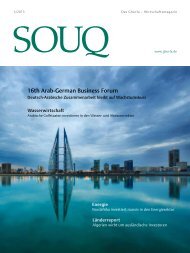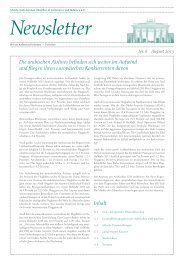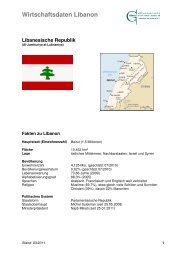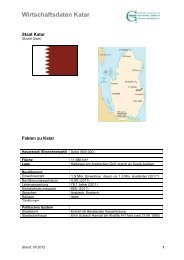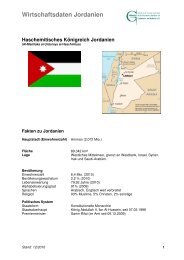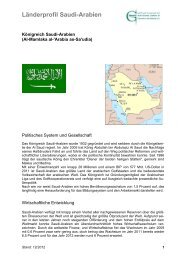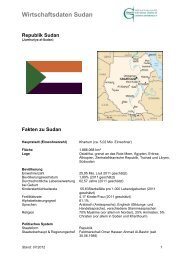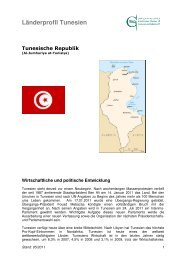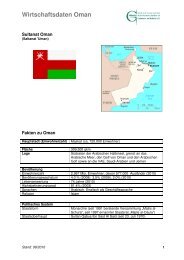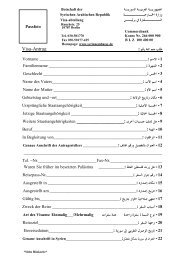Saudi-Arabien Wirtschaftshandbuch Saudi Arabia Business ... - Ghorfa
Saudi-Arabien Wirtschaftshandbuch Saudi Arabia Business ... - Ghorfa
Saudi-Arabien Wirtschaftshandbuch Saudi Arabia Business ... - Ghorfa
Sie wollen auch ein ePaper? Erhöhen Sie die Reichweite Ihrer Titel.
YUMPU macht aus Druck-PDFs automatisch weboptimierte ePaper, die Google liebt.
Einfuhren nach <strong>Saudi</strong>-<strong>Arabien</strong> dürfen nur von saudiarabischen<br />
Staatsangehörigen oder in saudischem Besitz<br />
befindlichen Unternehmen getätigt werden. Der<br />
Importeur muss im Handelsregister beim Ministerium<br />
für Handel und Industrie erfasst sein und eine Einfuhrlizenz<br />
besitzen, die jedoch einfach erhältlich ist.<br />
Bei etwa 80 Projektgruppen ist eine Pre-Shipment-<br />
Inspection erforderlich, wofür der Exporteur die entsprechenden<br />
Zertifikate im Exportland zu beschaffen<br />
hat. Die Inspektionen werden von durch die SASO<br />
benannten Gesellschaften in den Exportländern vorgenommen.<br />
Die Zertifizierung von importierten Lebensmitteln<br />
wird gleichfalls durch die SASO geregelt.<br />
Hier sind Herstellerzertifikate über die Nahrungsmittelbestandteile,<br />
Verbraucherschutzzertifikate und<br />
Preislisten durch den Exporteur vorzulegen. Medikamente<br />
und Pharmazeutika werden nur zur Einfuhr<br />
zugelassen, wenn sie vorab bei der dem Gesundheitsministerium<br />
unterstehenden Food and Pharmaceuticals<br />
Authority registriert wurden. Außerdem ist bei<br />
Einfuhr ein Ursprungszeugnis des Herstellers vorzulegen.<br />
Bei der Einfuhr von landwirtschaftlichen Erzeugnissen<br />
sind dem Landwirtschaftsministerium in<br />
Ergänzung zu den üblichen Verschiffungsdokumenten<br />
je nach Produkt gesonderte Zertifikate vorzulegen.<br />
Nach Einlagerung der Ware beim Zoll hat der Importeur<br />
innerhalb von 13 Tagen bei Seetransport und<br />
10 Tagen bei Luftfrachtversand die Zollauslösung<br />
vorzunehmen. Hierzu hat er der Zollbehörde die in<br />
Deutschland bescheinigten und legalisierten Originaldokumente<br />
(Kaufverträge, Rechnungen, Ursprungszeugnisse,<br />
Packlisten, Versandpapiere, Versicherungspolicen<br />
sowie o.g. Genehmigungen und Zertifikate)<br />
vorzulegen. Die Zollverwaltung prüft die Waren und<br />
Begleitpapiere, erhebt die Einfuhrabgaben und erteilt<br />
nach Entrichtung der Einfuhrabgaben die Freigabebescheinigung.<br />
–––––––––––––––––––––––––––––––<br />
trAdInG And cuStom duty<br />
reGulAtIonS<br />
On becoming a full member of the WTO, <strong>Saudi</strong> <strong>Arabia</strong><br />
finally committed itself to liberalising its trade regime.<br />
There are no currency restrictions or significant customs<br />
barriers. All imports are subject to customs inspections.<br />
A custom duty of 5% is raised for most products.<br />
hAnDelS- unD zOllBeSTiMMunGen – – trAdInG And cuStom duty reGulAtIonS<br />
This custom duty corresponds to the joint foreign tariff<br />
that the GCC states introduced when they established<br />
their trading union on 1st January 2003. Some products<br />
are still subject to a duty of 12%. There is also a duty<br />
of 20% for selected products to protect local industry.<br />
Exports from <strong>Saudi</strong> <strong>Arabia</strong> are relatively simple. Only<br />
an export certificate and a customs declaration need to<br />
be presented for the export.<br />
The import procedure is more or less liberalised. Almost<br />
all products can be exported to <strong>Saudi</strong> <strong>Arabia</strong>. The products<br />
need to satisfy the standards of the <strong>Saudi</strong> <strong>Arabia</strong>n<br />
Standard Organization (SASO). For religious reasons,<br />
there is an import embargo on various goods such as e.g.<br />
alcoholic drinks and pork. All imports from Israel are<br />
forbidden.<br />
Imports to <strong>Saudi</strong> <strong>Arabia</strong> may only be performed by<br />
<strong>Saudi</strong>-<strong>Arabia</strong>n citizens or companies owned by <strong>Saudi</strong>s.<br />
The importer must be registered in the commercial register<br />
of the Ministry for Trade and Industry and have an<br />
import licence, which is simple to obtain.<br />
Pre-shipment inspections are stipulated for around 80<br />
project groups; the exporter needs to obtain the appropriate<br />
certificates for this in the export country. The<br />
inspections are carried out by companies in the export<br />
countries named by the SASO.<br />
The certification of imported foodstuffs is also governed<br />
by the SASO. The manufacturer certificates stating the<br />
food ingredients and price lists need to be presented by<br />
the exporter. Medicines and pharmaceuticals are only<br />
approved for import if they have been registered first<br />
with the Food and Pharmaceuticals Authority that answers<br />
to the Ministry of Health. Also imports need a<br />
certificate of origin from the manufacturer. When importing<br />
agricultural goods, special certificates also need<br />
to be presented to the Ministry for Agriculture for each<br />
product in addition to the usual shipping documents.<br />
After the goods have been warehoused by customs, the<br />
importer needs to collect them within 13 days for sea<br />
freight and 10 days for air cargo. On collection, the importer<br />
must submit the original documents signed and<br />
authorised in Germany (the purchase contract, invoices,<br />
certificates of origin, packing lists, shipping papers,<br />
insurance policies and all above-mentioned approvals<br />
and certificates) to the customs officials. The customs<br />
administration checks the goods and accompanying papers,<br />
raises the import charges and issues the release certificate<br />
on receipt of the import duties.<br />
93



